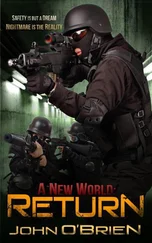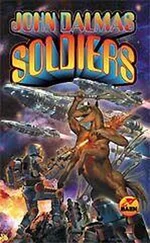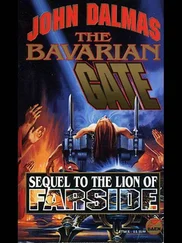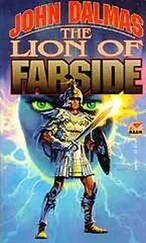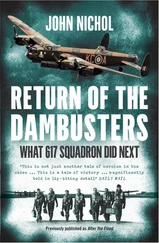John Dalmas - Return to Fanglith
Здесь есть возможность читать онлайн «John Dalmas - Return to Fanglith» весь текст электронной книги совершенно бесплатно (целиком полную версию без сокращений). В некоторых случаях можно слушать аудио, скачать через торрент в формате fb2 и присутствует краткое содержание. Жанр: Фэнтези, на английском языке. Описание произведения, (предисловие) а так же отзывы посетителей доступны на портале библиотеки ЛибКат.
- Название:Return to Fanglith
- Автор:
- Жанр:
- Год:неизвестен
- ISBN:нет данных
- Рейтинг книги:4 / 5. Голосов: 1
-
Избранное:Добавить в избранное
- Отзывы:
-
Ваша оценка:
- 80
- 1
- 2
- 3
- 4
- 5
Return to Fanglith: краткое содержание, описание и аннотация
Предлагаем к чтению аннотацию, описание, краткое содержание или предисловие (зависит от того, что написал сам автор книги «Return to Fanglith»). Если вы не нашли необходимую информацию о книге — напишите в комментариях, мы постараемся отыскать её.
Return to Fanglith — читать онлайн бесплатно полную книгу (весь текст) целиком
Ниже представлен текст книги, разбитый по страницам. Система сохранения места последней прочитанной страницы, позволяет с удобством читать онлайн бесплатно книгу «Return to Fanglith», без необходимости каждый раз заново искать на чём Вы остановились. Поставьте закладку, и сможете в любой момент перейти на страницу, на которой закончили чтение.
Интервал:
Закладка:
One of the Varangians grinned at us and said something in Norse. Arno had been practicing the
language, and seemed to be doing pretty well, so I asked him what the man had said.
"He said the oar does that to you, when you're not used to it. And that the best cure for the oar is the oar. Yesterday one of them told me they were all sore the second day out of Miklagard."
I examined my hands-an oozing mess. I got another bucket of salt water to soak them, then just sort of flexed and unflexed them to limber them up before using the oar again.
The first minute was the worst, as far as pain was concerned.
As I rowed, I thought of the young slave oarsman that Deneen and Tarel had rescued. He must be pretty tough, I decided. I hoped he didn't cause any problems on their wilderness island. In Deneen's description, though, Moise had sounded all right. And Bubba had approved of him; that was the best assurance I could ask for.
By mid-morning my muscles weren't nearly as sore, although I was tired again, and even my hands felt better. As I had the day before, I soaked them in salt water for a while after each shift. We were finishing off our lunch when one of the Varangians saw sails to the southwest. They were triangular-two at first, and quickly two more. If we kept our present course, we'd just about run into them.
Gunnlag began shouting orders. Then, pulling on his steering oar, he put us into a long turn toward the north. The other rowing shift moved quickly to their oars. Of my shift, some began lowering the spar and sail, while others hauled furiously on the tow rope, taking in the slack that formed before the horse ship's steersman could match our turn. Arno ran to the stern of the long ship, his expression a mixture of chagrin and determination.
I saw Michael questioning a Varangian, and went over to him. "What is it?" I asked.
"The captain believes the sails are a Saracen fleet, and I think he is right. If that is so, we will have to abandon the prize ship and flee, else we will be taken."
Abandon the horse ship, and Arno's herd! Meanwhile, Gunnlag was determined to pick up his men aboard her. By that time I could see seven or eight sails, and surely they had seen ours. I grabbed the braided leather rope and helped pull; under the circumstances, I almost forgot how sore my hands were.
When we'd completed our turn, the oarsmen slowed until we'd pulled the prize ship's bow against our stern. As soon as they bumped, Arno vaulted across, and I thought I knew why: He wanted to find the spare charge cylinders for the blast pistol. Meanwhile the Varangian prize crew was scrambling aboard the long ship, but not the Greek crew; they were staying! Whether by choice or Varangian order, I didn't know. When the last Varangian was aboard, one of them raised his sword to cut the rope-and Arno wasn't back aboard yet! I grabbed the Varangian's sword arm and began yelling.
"Arno!" I yelled. "For God's sake, get back here! They're going to cut the rope!"
The Varangian stared, bug-eyed and indignant, for just a second, then aimed a punch at my head with his free hand, but I ducked it. Gunnlag shouted at him, then across at Arno in Norse, and the man I had hold of stopped trying to shake me loose. A moment later Arno came out of the hold and leaped aboard. Another Varangian cleft the rope.
"They were not there!" he said. "Someone must have thrown them overboard, else I'd have found them." His eyes were blazing. "If I had them, I could drive back the entire Saracen fleet. Then I'd take over this ship and make them row us to Palermo as my prize!"
I didn't argue with him. For one thing, there wasn't time. By then the mast was lying in the Song ship's bottom with the spar and sails, and Gunnlag ordered all oars manned. It was plain how things were shaping up. Maybe twenty sails were visible now, and I had no reason to think there weren't more. Five others had dropped their sails and veered toward us-five of those nearest the front. Obviously they were being rowed, which meant they were either warships or pirates. And I presumed that pirates didn't travel in large fleets.
One of the Varangians was handing oars to my shift, and we added our strength to the rowing. The graceful long ship surged, almost seeming to fly on the water. It occurred to me how relative things are-how much they depend on your local frame of reference. Even in mass proximity mode the Javelin could travel in minutes a distance as far as from Fanglith to her moon, and we thought of mass proximity mode as slow. Here we were traveling-what? Not more than than ten miles an hour, I thought, and it seemed fast.
After a few minutes, Gunnlag's big voice called again, and the bosun slowed our pace a few strokes a minute. We might have to stay ahead of our pursuers for hours, I realized, and it wouldn't do to use ourselves up at the start. I glanced up to see what I could see, which under the circumstances wasn't much. They'd struck their masts too. I returned my full attention to rowing; I had to keep the stroke and not miss the water with my oar.
Meanwhile we had spare men. There hadn't been oars for all of my shift, and now we had the prize crew aboard as well. So after a while some of us were replaced at our oars to rest, including all three of us non-Varangians. Ordinarily, the Varangians didn't mind rowing, and considering that this was a matter of escape or die, they probably wanted the best oarsmen on the oars. Which didn't include Michael and me, or even Amo.
I took half a minute to try contacting Deneen, on the off chance she was somehow powered up and tuned in, but got no answer. Then I followed Arno back to Gunnlag Snorrason in the stern, with Michael behind me. Most of the Saracen fleet was out of sight again; apparently they'd continued on their original northwesterly course. Judging from the sun, we seemed to have veered all the way around to somewhat east of north.
Only three of our original five pursuers could be seen. I suppose the other two had turned aside to capture the horse ship. But the remaining three, I told myself, ought to be more than enough, considering that Arno had no replacement charges for his blaster. And their bows had a lot longer range than my stunner; it was only effective up close.
Arno was talking to Gunnlag in Norse-he'd gotten pretty good at it-and of course I couldn't understand. So I questioned Michael. From what he said, I got the impression that a warship was more of a troop carrier loaded with infantry than it was a fighting ship. Lots of naval battles on Fanglith amounted to boarding the enemy with your troops and fighting it out with swords. Any one of our pursuers would have two or three times as many fighting men as we had, maybe more.
No, he said, the Saracens were not the fighters the Varangians were. Mostly they were men of smaller frame, less brawny and not so savage, wearing lighter mail and wielding lighter weapons. That much was well known.
But they were brave and skilled, and when they caught us they'd be fresh, because slaves did their rowing.
Could slaves row as hard as the Varangians? I asked. Michael thought not-Byzantine slaves couldn't anyway. But the dromans, the big Saracen warships, had as many as fifty great oars each, each pulled by two men, with the whip to inspire any who didn't pull hard enough.
After a while we sat down at the oars again for about an hour. The next time I was relieved, the Saracens had gained quite a bit. The Varangians who weren't rowing were arguing with each other and with Gunnlag. Michael explained that some of them wanted to stand and fight while others thought we ought to keep running.
It seems that Arno had told them earlier that the Normans held most of Sicily now-probably including the part we were headed for. Even if they didn't, a strong party of determined warriors might make their way to Norman territory. And Roger, the Count of Sicily, who was notoriously generous, would be glad to hire Varangians in his army, or help them continue home as Christian pilgrims.
Читать дальшеИнтервал:
Закладка:
Похожие книги на «Return to Fanglith»
Представляем Вашему вниманию похожие книги на «Return to Fanglith» списком для выбора. Мы отобрали схожую по названию и смыслу литературу в надежде предоставить читателям больше вариантов отыскать новые, интересные, ещё непрочитанные произведения.
Обсуждение, отзывы о книге «Return to Fanglith» и просто собственные мнения читателей. Оставьте ваши комментарии, напишите, что Вы думаете о произведении, его смысле или главных героях. Укажите что конкретно понравилось, а что нет, и почему Вы так считаете.

